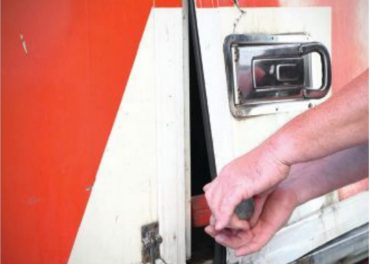
John Bleasby
Do you have work site insurance for your tools?
Canadian ContractorStolen tools mean downtime, financial loss and headaches all round
It’s possibly the biggest nightmare for contractors and trades — tools that disappear overnight from the work site. In fact, Canadian Contractor ran a Contractor Dilemma contest on that very subject 18 months ago . The story was that Bryce Christie’s trailer had been broken into over the weekend. Although Bryce only had some scrap wood stored, his sub trade carpenter Johnny Millen had put all his tools in there. It was a huge loss for Millen. What should Bryce do about it?
We recently turned that question over to contractor insurance expert Dave Elliot of InsureMyTools.ca for some ideas on how contractors could protect themselves in such a situation.
What do you think about Bryce’s dilemma, Dave?
First, in terms of prevention, a contractor like Bryce should have a Commercial Insurance Policy including CGL (Commercial General Liability) as well as tool coverage, coverage that applies both on and off site. Secondly, and this is important, contractors should check to ensure that the policy does not carry a locked vehicle warranty. It’s in the long form wordings of the policy — you have to look for it. All policies are different, so contractors need to partner with a trusted provider, or do their homework and review the wordings before purchasing the coverage. Also, the storage trailer should be insured through the contractor’s auto policy.

Was it locked? If your policy has a ‘Locked Vehicle Warranty’, you may be out of luck if your trailer was not properly secured
That “locked vehicle warranty” sounds like a sleeper that could catch contractors. What does it mean exactly?
Most contractors’ policies today contain a locked vehicle warranty. That means your tools must be locked at all times. There must be visible signs of forced entry in the event of theft or attempted theft for your policy to respond in the event of a claim. If you are working with a company that understands the nature of a contractor’s work, it is possible to write a policy that does not contain a locked vehicle warranty. That way, if you are in a hurry to stop a leaky pipe, for example, and forget to lock your tools, you can be covered.
How tool-specific should coverage be?
Policies vary. Some tool coverage can be “blanket” form, which means the insurance company will list a total amount as well as a maximum amount per item. Other policies require that each tool be listed. Normally, for any machinery with a serial number, you will want to list it for your own reference anyway, regardless of whether the policy is blanket coverage or not.
How about commercial policies? Are they more or less the same?
No. General contractors, sub-contractors, electricians and plumbers should have a commercial insurance policy specific to their business operations in force at all times. At minimum, you will also want to ensure that the policy includes CGL (Commercial General Liability) as well as a tool and equipment floater with sufficient limits to cover the maximum value of tools or equipment that you would have with you at any one time. With a proper tool and equipment floater on your policy, the tools and equipment stored or transported to various job sites are protected and not restricted to any one specific site. After that point, there are a range of different coverages that can be added, from installation floaters, professional liability, loss of use of equipment, and business interruption to name a few. Take time to review all the options with your insurance provider, and be sure your provider is well versed in the options for insurance for contractors and that they deal with more than one Insurance company.
Getting back to Bryce, could his policy have helped Johnny?
Typically, no. The trades working on site should have their own CGL that also covers their tools. Sorry, Johnny!
Down time is critical in construction. How long does it typically take for a claim to be paid out?
It truly depends on the claim. Normally a couple weeks, but this can be shortened or lengthened depending on police investigations, details regarding the tools, and a variety of other items.
What can be done to reduce down time?
If the contractor is dependent on certain tools or equipment, it’s extremely important that their policy include coverage for loss of use tool or equipment rental charges while waiting for replacement. At InsureMyTools.ca, even our basic package includes $10,000 coverage for loss of use for machinery and equipment. For example, if a Bobcat was stolen, that would cover the cost of renting a replacement so work could continue until the claim settlement arrives.
Does a claim mean future premiums will increase?
It depends. Most policies have a small claims free discount (10-20 per cent) for being claims-free over a certain amount of time (usually 3-5 years). The first impact of a claim would be the loss of this discount. Depending on the claim, the company may also mitigate future losses by increasing deductibles, or requesting certain preventative actions be taken. For example, after a mysterious theft on a job site, the insurance company might want to hear what actions you are taking to reduce theft to ensure it doesn’t happen again. Depending on the particular insurance company and number of claims made, the insurer may also choose to not offer an insurance renewal. That’s why it’s important to deal with a company that is focused on contractors’ insurance and can offer help navigating the insurance world. A word of advice; if your provider is the same as your personal home and auto, you may want to look around and educate yourself on the available options out there.

Don’t count on thieves knowing if you paid extra for that tool tracker app.
Obviously theft avoidance is important. Any tips?
This is a great question. There are numerous ways to avoid theft. Obviously, the trailers and jobsite should be locked and secure at the end of the day. You can also reduce the likelihood of theft through lighting as a well-lit area tends to discourage thieves. Sometimes it’s as simple as ensuring keys are removed from equipment when parked. Parking in a high traffic, visible area also helps. In extreme cases, you can always hire a third party security firm to oversee.
Some tool manufacturers offer apps that can disable tools if they drift away from a pre-set location. Are insurance companies interested in those types of innovations?
I feel it’s too soon to see the effect of these apps. Although they are useful for locking the tool when stolen, I’m not sure it will prevent the theft unless the thieves know this when they enter the job site. For example, if a thief is rummaging a dark job site, he may not realize the tool has an antitheft device until he has stolen it and taken it home. The thief will later realize the tool is useless and will likely dispose of the tool, but that doesn’t help the contractor. Until we are able to educate the thieves that these apps can render a tool useless, I feel they will do very little to prevent the theft. The positive, I suppose, is that the apps will stop the thief from using the tool or reselling it.
Related: Insuring the big stuff is critical for contractors
Got feedback? Make your opinion count by using the comment section below,
or by sending an email to:
JBleasby@canadiancontractor.ca
Follow John on Instagram and on Twitter for notifications about his latest posts


Leave a Reply